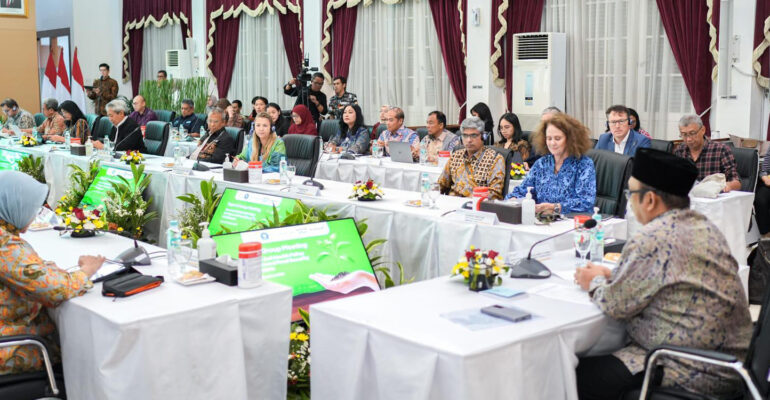Joining Bappenas Expert Dialogue in Jakarta, PPLH IPB University Discusses Indonesia’s Soil Health

IPB University’s Center for Environmental Research (PPLH) Environmental and Climate Change International Research Institute (LRI LPI) participated in the Expert Dialogue: Towards Soil Health Policy for Improved Food Security in Indonesia which took place at the National Development Planning Agency (Bappenas), Central Jakarta.
The activity was conducted in preparation for the drafting of the National Medium-Term Development Plan (RPJMN) for 2025-2029. The discussion highlighted the crisis and urgency of soil health in Indonesia and pointed out the importance of investing in soil health to meet Indonesia’s long-term development goals.
The material sessions at this activity were delivered in three sessions. Professor of the Faculty of Agriculture (Faperta) IPB University, Prof Arief Hartono delivered a topic entitled “Soil Health Crisis in Indonesia” in the first session.
He said that soil has an important role in food fulfillment. However, the fact is that one-third of the world’s soil has been degraded, so that the soil’s ability to support plant growth has decreased.
“The crisis of soil or land health is caused by several things, such as agriculture of one type of commodity that uses excessive pesticides and chemical fertilizers, and climate change,” he said.
Prof Arief explained, based on the land health database at IPB University, the condition of agricultural soil content in Java Island is known to have a pH <6 as much as 74 percent, total nitrogen <0,2% as much as 77 percent, organic carbon <2% as much as 76 percent, and potassium <0,31 cmol/kg as much as 38 percent.
According to him, multi-stakeholder involvement is needed, especially in intensification programs for the nutritional status of agricultural soils in Indonesia as well as the transformation of agricultural systems and changes in government policies.
In the second session, Husnain, MP, PhD from the Directorate General (Dirjen) of Land and Irrigation, Ministry of Agriculture said that the soil conditions in Indonesia are not all in a fertile condition. Indonesian soil also suffers from other agricultural sustainability issues such as soil, water and environmental degradation.
“If you want to do cultivation, then the soil conditions must be in an open condition. However, open soil conditions tend to be unhealthy, so soil quality improvement programs such as Integrated Plant Nutrient Management (IPNM), in-situ organic matter with Organic Fertilizer Processing Units (UPPO), soil conservation, precision farming, and increased efficiency with mechanization are needed,” he explained.
Prof Rizaldi Boer, Chief of LRI LPI IPB University responded to this by saying that in addition to integrated policies, extension programs are also needed to farmers, especially to inform the types of seeds or fertilizers that are suitable so that the program can be implemented accordingly and on target.
Furthermore, Harm Haverkort, Acorn Rabobank Partnership Lead Asia stated that he is ready to collaborate with Indonesia on carbon and agroforestry programs. According to him, Rabobank’s program applies to all farmers in the world. (*/Nr) (IAAS/RUM)



